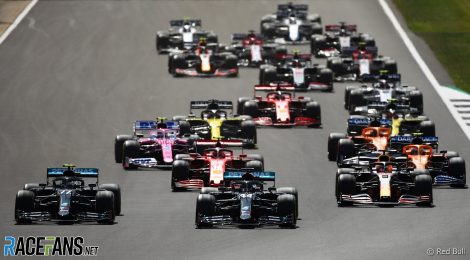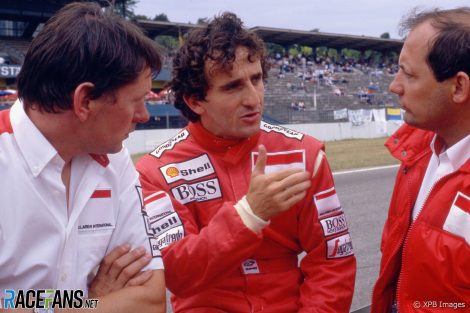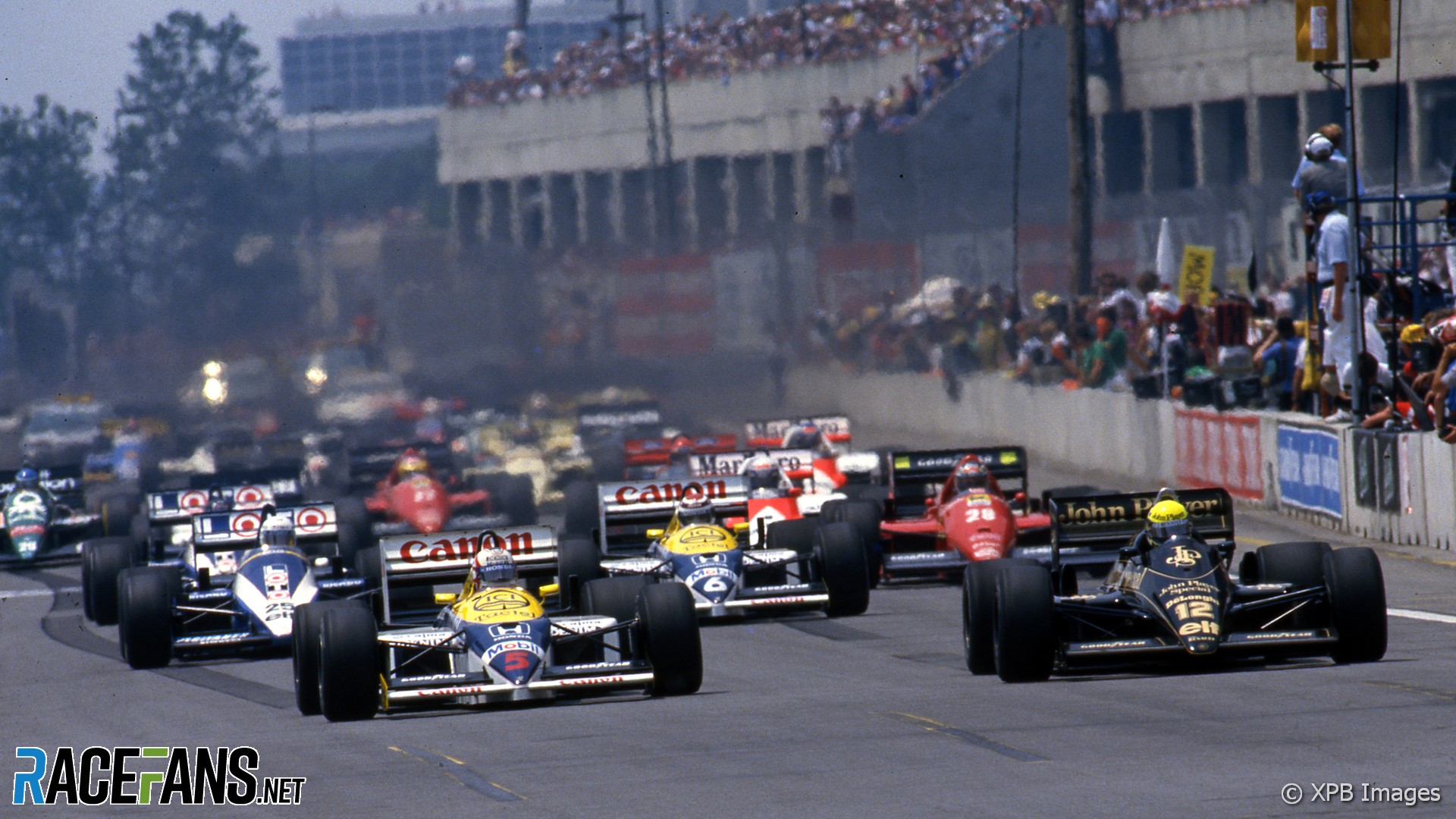Formula 1’s plan to introduce Saturday sprint races to decide the grid this year is not a new idea. Not only has it been on the agenda for the past two years – and repeatedly failed to win favour – a similar concept was cooked up 35 years previously.
The two schemes came about for very different reasons, though in both cases drivers raised doubts over them. And while the original plan for Saturday sprint races was dropped in 1986, the latest proposal looks likely to win approval.Formula 1 is pushing to introduce sprint races this year – on a three-race trial basis to begin with – for financial reasons which were picked apart in detail here previously. Turn back the clock 35 years to the height of the turbo era and a similar plan was being touted, albeit for different reasons: not income, but safety.
The death of star driver Gilles Villeneuve in a crash as he tried to take pole position for the 1982 Belgian Grand Prix focused F1 minds on the dangers of qualifying during the eighties.

The drivers of these single-lap specials were trying to set flying laps while dodging between rivals on slow laps around narrow circuits without the benefits of modern radios and GPS data to alert them of any dangers ahead. The potential for another crash such as the one which had claimed Villeneuve – his Ferrari was launched into the air when he struck Jochen Mass’s March – prompted calls for an alternative to qualifying.
So in mid-1986 the executive body of FISA (now the FIA) debated whether to hold short Saturday races instead of qualifying sessions to decide the grid.
Advert | Become a RaceFans supporter and
Then as now, the rule-makers were anxious to avoid the impression they were diminishing the significance of the main event, the Sunday grand prix, by adding an extra race. A euphemistically-worded statement from the FISA Executive Committee therefore described the 1986 Saturday sprint race plan as “a qualifying session over a distance of 25% of the length of the race on Sunday”.

The most radical aspect of the current plan is that it wouldn’t be introduced for the entire championship, but just three weekends on a trial basis. Having multiple race weekend formats during a single season in this way is almost unheard of in modern times, and a major break with F1’s history.
But having tried and failed three times to win teams’ support for the much-derided – not least by drivers – reverse-grid Saturday race format, F1 seems to have finally twigged how to get teams behind sprint events. Namely, put the idea forward in the broadest terms possible so they have little to object to, let a working group work out the details, and produce a proposal which is likely to prove acceptable to all.
There’s a creeping sense of inevitability about the introduction of sprint races, right down to the spin on the official F1 website. “Ferrari trio Binotto, Leclerc and Sainz keen on F1 sprint race proposals”, it proclaimed yesterday, though RaceFans readers who had already seen the same interview here earlier will have noticed the later article omitted several of Sainz’s quotes which didn’t fit the headline.
Advert | Become a RaceFans supporter and
You have to wonder whether the next PR move will be not to announce the final details of the format – for fear it may receive a critical response from fans – until the teams have already voted in favour of it.

Go back 35 years and the drivers of the day had little time for the qualifying race plan. “It’s completely ridiculous,” fumed reigning champion Alain Prost during the French Grand Prix weekend. “We are the people involved in it and no one has consulted us at all.”
But the 1986 qualifying race proposal was not approved. Not so much because the idea was unpopular, but because the safety concerns which prompted it receded. An agreement was reached to reduce the power of the turbos, and ultimately phase them out entirely. And an unexpected change further lowered the stakes and reduced the potential dangers of qualifying.
In September that year Pirelli announced their withdrawal from Formula 1. At a stroke this ended their ‘tyre war’ with Goodyear. Without a rival to beat, Goodyear no longer had an incentive to produce qualifying tyres, and therefore stopped doing so in order to slash the cost of its F1 programme.
In Formula 1, money usually talks. And so, for the same reason, it would be a surprise if the latest sprint race proposal doesn’t get the nod of approval.
Join the RaceFans Supporters Drive!
 If you've enjoyed RaceFans' motor sport coverage during 2020, please take a moment to find out more about our Supporter Drive.
If you've enjoyed RaceFans' motor sport coverage during 2020, please take a moment to find out more about our Supporter Drive.
We're aiming to welcome 3,000 new Supporters to help fund RaceFans so we can continue to produce quality, original, independent motorsport coverage. Here's what we're asking for and why - and how you can sign up:
2021 F1 season
- Verdict on error in GT race suggests Mercedes would have lost 2021 Abu Dhabi GP appeal
- Title ‘stolen’ from Mercedes made us ‘underdogs people cheer for’ – Wolff
- Red Bull Racing spent £230m during Verstappen’s title-winning 2021 campaign
- ‘I can’t box?’: Hamilton and Verstappen’s 2021 Abu Dhabi GP radio transcript
- Abu Dhabi’s legacy one year on: How the controversial 2021 finale changed F1





SadF1fan
2nd March 2021, 8:14
F1 claims it want unpredictability, but then allows teams to run simulations all day long, during a raceweekend. Why is all this data allowed to be sent back & forth between homebase and the team at the track?
F1 claims it wants unpredictability, but allows cars to drive upto 10s slower during the race than they are capable of during qualification. Driving a fast car slowly isn’t going to cause as many or as grave a mistake as driving the same car on the limit.
Predicted randomness is what they are trying to introduce, not unpredictability. Unpredictability actually scares the people in charge, because it would mean the situation is no longer under their control.
bernasaurus (@bernasaurus)
2nd March 2021, 8:28
I never knew this, i’m happy to try anything and take a more informed view once I’ve seen it. I am sceptical though, it seems a bit ‘half baked’, I’d actually be happier to see what reverse grids look like, with this we’re probably just get a shortened version of the main event, which as a sport, F1’s predictability is what turns people off. People tune in on a Sunday in the hope that Mercedes aren’t half a second quicker than the next car, sprint races might just confirm that and people will do something else on a Sunday instead.
JohnH (@johnrkh)
2nd March 2021, 8:37
One of the issues I see with the introduction of a second race is it will detract from the main race. One of the big draw cards of F1 in the past was it’s exclusiveness. For most countries holding an F1 race was the biggest Motor Racing Event of the year, sometime the biggest sporting event period. Having multiple race in a single country in a single season as is on the table for the US and China is slightly risky. Having multiple races on a weekend I feel will devalue the sport overtime and be counter productive to what the sport should be.
F1 frog (@f1frog)
2nd March 2021, 8:44
Yes, exactly. Sprint races will make F1 more like all the other series. Right now, Formula 1 is unique, and I think it should stay like that. Anyone who doesn’t like it should watch one of the other series (of which there are many) which does have multiple races – including reverse grids.
Jon Thereyougo (@jon-thereyougo)
2nd March 2021, 10:04
While I welcome the idea to test a new format on certain weekends, I don’t see how a qualifying race would spice up the show. The grid will be largely the same, so actually if they go for sprint races it should be in reverse order AND with DRS disable.
That way the midfield teams at least stand a chance to stay ahead of Mercedes and it would probably make for better racing.
Picasso 1.9D FTW (@picasso-19d-ftw)
2nd March 2021, 13:12
Well I’m evidently in a minority but I’m up for the sprint races, none of the objections resonate strongly with me, however valid they may be. Or rather, whilst I agree that the main race mustn’t be devalued I’m sure there are ways to have sprint races without harming the main event. Personally I’d like to see the grid decided by lots – it seems less perverse than reverse grids but throws in the chance for a shake-up – and I’d like to see some points allocated. It’s a different format – no pit-stop strategy to speak of, and this may open up chances for the small fry to show their strengths. Mind you I suspect it wouldn’t actually help people like Russell, who gets so much out of his car in qualifying but is hampered by it in the race – he might actually end up with worse Grand Prix grid slots than through regular qualy!
I would take issue with Keith’s contention that “the most radical aspect of the current plan is that it wouldn’t be introduced for the entire championship, but just three weekends on a trial basis”. I mean, yeah, different formats within a year is unusual (but not unprecedented because we’ve previously seen awful qualifying formats dropped partway through a season). But it pales into insignificance against the change itself, and it makes a great deal of sense to see how it works IRL – radical would have been to impose it over the whole season.
F1 frog (@f1frog)
2nd March 2021, 13:28
No. Random grids are much worse than reverse grids. With reverse grids at least the title contenders are all at the back together. With random grids, one can be at the front and the other at the back, which is much worse. There was an IndyCar race in 2011 where they did a random grid, and Will Power was 3rd on the grid, with Dario Franchitti 28th. I really dislike reverse grids, but I would still prefer them to random grids.
StefMeister (@stefmeister)
2nd March 2021, 13:55
@f1frog
That was at Texas.
They split the race in 2. The first half had the grid decided by standard qualifying & then during the break before the start of the 2nd half they did a random draw to decide the starting order for it. And as you say it split the 2 championship contenders with Power lucking into a starting position towards the front & going on to dominate the race (Also taking the points lead) with Dario drawing a position at the back & struggling to make his way through eventually finishing 7th.
The concept proved universally unpopular & was therefore never done again.
Picasso 1.9D FTW (@picasso-19d-ftw)
2nd March 2021, 14:04
@f1frog @stefmeister I would totally object to random grids for the main race, but this is a qualifying race. Though to qualify that (sorry), I did also say I’d like to see some points assigned and I can understand objections to random grids in that situation. I guess that, as you say, a reverse grid has the advantage of handicapping the championship contenders to a similar degree. Clearly it’s also very unpopular though, for whatever reason
Robbie (@robbie)
2nd March 2021, 18:20
I’ve spoken about this at great length already, and boy am I tempted to write another novel over some of the things in this article, but rather I’ll just try to keep it relatively brief.
I don’t have any fear of a Saturday qualifying sprint race diluting the actual race, but certainly what would help is that they not award points for this as to me it is still qualifying just done in a more exciting way, and the winner should be the pole winner as usual. So I do note that what is missing from the F1 website article is Sainz mentioning the ‘danger’ of having two winners in one weekend. To me that is a bit of splitting hairs, again, as long as they don’t award points for the sprint race, because to me it is still qualifying. We already theoretically have three winners, actually check that four winners that get denoted in the record books after a race weekend. We have a pole winner, we have a race winner, we have a fastest lap winner, and we have a Constructor winner. This sprint race concept does not add another winner that doesn’t already exist now, that being a pole winner.
I note that the article above contains a lot of reminders of reverse grids, which has been dropped so that should be a good thing, and the reference to 1986 has Prost saying they the drivers were not consulted, and here we have the teams and drivers being consulted. Using the same tactic as the F1 web article used in not including all of Sainz’s opinion, which in a way was already said by Leclerc anyway, this article above does not include any reference to this site’s own article from Feb 26 about F1’s race promotions head Chloe Targett-Adams talking about preserving F1’s DNA and about including the FIA and the teams in the working group, opposite to the type of complaint Prost had back in the day.
Is it all about revenues and nothing more? Does money talk in F1? Of course it does and always has. But if they had waited to hear from the fans on the budget caps for example, and the type of racing and even DRS, they wouldn’t have made the vital and sweeping changes that were so badly needed, and instead would have felt compelled to let F1 become even more unsustainable to the point of disappearing for fear that fans would reject the lack of innovation (read outlandish spending) and cars that don’t need changing for ‘the racing is fine as it is’ and ‘DRS is good.’
Dave
2nd March 2021, 19:23
Rejected 35 years ago. Reject it today.